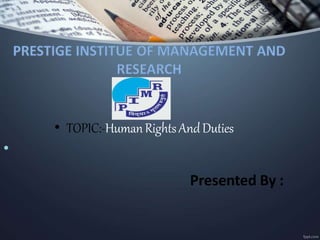humanrightsandduties-150805163042-lva1-app6891.pptx
- 2. Human rights is a charter of rights contained in the Constitution of India. It guarantees civil liberties such that all Indians can lead their lives in peace and harmony as citizen of India. These include individual rights common to most liberal democracies, such as equity before law, freedom of speech and expression and peaceful assembly etc. Violation of these rights result in punishment as prescribed in the Indian Penal Code. Introduction to Human rights:
- 3. ? Right to protest again exploitation. ? Right to equality. ? Right to religious freedom. ? Right of freedom. ? Right to education and culture. ? Right to constitutional remedies. ? Right to elementary education. Human rights:
- 4. ? The abolition of trafficking in human beings and beggar (forced labour). ? Abolition of employment of children below the age of 14 years in dangerous jobs like factories and mines. ? Beggar, practiced in the past by landlords, has been declared a crime and is punishable by the law. ? Trafficking in human for the purpose of slave trade or prostitution is also prohibited by the law. ? Child labour is considered a gross violation of the spirit and provision of the constitution. RIGHT TO PROTEST AGAINST EXPLOITATION:
- 5. ? Freedom of speech and expression which enables an individual to participate in public. Reasonable restrictions can be imposed in the interest of public order, security of state etc. ? freedom to move freely throughout the territory of India. RIGHT TO FREEDOM:
- 6. ? Article 14 of the constitution guarantees that all citizens shall be equally protected by the law of the country. ? Article 15 of the constitution means that state cannot discriminate any of the Indian citizen on the basis of religion, caste, sex or place of birth. ? Article 16 of the constitution lays down that the state cannot discriminate against anyone in the matter of employment. The state may also reserves posts for backward classes, scheduled caste and scheduled tribe. ? Article 17 of the constitution abolishes the practice of untouchability, as it is offence and anyone doing it is so punishable by the law. RIGHT TO EQUALITY:
- 7. ? Everyone has the right to practice his or her own religion , or no religion at all. ? This right is covered in article 25,26,27 and 28. ? The objective is to sustain the principle of secularism in India. ? According to constitution ,all religions are equal before the state and no religion shall be given preference over the other. ? Citizens are free to practice and propagate any religion of their choice. RIGHTS TO RELIGIOUS FREEDOM:
- 8. ? As India is a country of many languages, religions and culture , the constitution provides special measures in article 29 and 30, to protect right of minorities. ? Any community which has a language and a script of its own has the right to conserve and develop it. ? No citizen can be discriminated against for admission in state. ? All minorities can set up their own educational institution. RIGHT TO EDUCATION AND CULTURE:
- 9. ? It is created as one of the main fundamental right, because the constitution recognized the need to protect the right of the citizens. It empowers the citizens to move a court of law in case of any denial of the fundamental rights. ? In case of imprisonment, the citizen can ask the court to see if it is according to the provisions of the law of the country. ? According to Article 32, Indian citizens can stand up and fight for their fundamental rights if they are breached. RIGHT TO CONSTITUTIONAL REMEDIES:
- 10. RIGHT TO ELEMENTARY EDUCATION: ? Article 21- On 2 April 2010, India joined a group of few countries in the world, with a historic law making education a fundamental right of every child coming into force. Making elementary education an entitlement for children in the 6¨C14 age group, the Right of Children to Free and Compulsory Education Act will directly benefit children who do not go to school at present. Prime Minister Manmohan Singh announced the operationalisation of this Act.
- 11. The Fundamental duties are defined as the moral obligations of all citizen to help promote a spirit of patriotism and to uphold the unity of India. These duties , set out in part IV- A of the constitution concern individual and the nation. Like the directive principles, they are not legally enforceable. INTRODUCTION OF DUTIES:
- 12. ? To abide by the constitution and respect the national flag and the national anthem. ? To promote harmony and the spirit of common brotherhood amongst all people of India transcending religious , linguistic and regional or sectional diversities and to renounce practices derogatory to the dignity of women. ? To strive towards excellence in all spheres of individual and collective activities, so that the nation rises to higher level of endeavor an achievement. DUTIES:
- 13. ? To provide opportunities for education by parents, guardians, to his style, or a ward between the age of 6-14 years as the case may be. ? To uphold and protect the unity and integrity of India. ? To value and preserve the rich heritage of our composite culture. ? To protect and improve the natural environment including forest, lakes, rivers and wild life and to have compassion for living creatures.
- 14. But are these rights taken seriously? Are they followed and looked upon? The Reality Check
- 15. Shaheen Dhadha ¨C A girl sent to jail for posting a comment on a politician on a social networking site (Facebook.) Right to Freedom(Speech)?
- 16. 10,000 children working in the 1,000 silk factories in Karnataka, Tamil Nadu and Uttar Pradesh. Right against Exploitation?
- 17. Right to Constitutional Remedies? Right against Explotation? VIOLATED
- 21. THE DIFFERENCE
- 22. Right to Religious Equality?

























